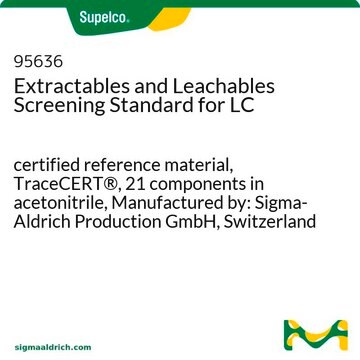650560
tert-Butyl methyl ether
HPLC Plus, for HPLC, GC, and residue analysis, 99.9%
Synonym(s):
MTBE, Methyl tert-butyl ether
About This Item
Recommended Products
grade
HPLC Plus
for residue analysis
Quality Level
vapor density
3.1 (vs air)
vapor pressure
4.05 psi
assay
99.9%
form
liquid
autoignition temp.
705 °F
expl. lim.
15.1 %
technique(s)
HPLC: suitable
gas chromatography (GC): suitable
impurities
≤0.02% water
<1.0 ppb Fluorescence (quinine) at 365 nm
evapn. residue
≤0.0001%
halogenated residue
≤10 ng/L (as heptachlor epoxide)
refractive index
n20/D 1.369 (lit.)
bp
55-56 °C (lit.)
mp
-110 °C
density
0.74 g/mL at 25 °C (lit.)
λ
H2O reference
UV absorption
λ: 210 nm Amax: 1.0
λ: 225 nm Amax: 0.50
λ: 250 nm Amax: 0.10
λ: 300-400 nm Amax: 0.005
application(s)
food and beverages
SMILES string
COC(C)(C)C
InChI
1S/C5H12O/c1-5(2,3)6-4/h1-4H3
InChI key
BZLVMXJERCGZMT-UHFFFAOYSA-N
Looking for similar products? Visit Product Comparison Guide
Related Categories
General description
Application
Other Notes
Legal Information
signalword
Danger
hcodes
Hazard Classifications
Flam. Liq. 2 - Skin Irrit. 2
Storage Class
3 - Flammable liquids
wgk_germany
WGK 1
flash_point_f
-18.4 °F - closed cup
flash_point_c
-28 °C - closed cup
Certificates of Analysis (COA)
Search for Certificates of Analysis (COA) by entering the products Lot/Batch Number. Lot and Batch Numbers can be found on a product’s label following the words ‘Lot’ or ‘Batch’.
Already Own This Product?
Find documentation for the products that you have recently purchased in the Document Library.
Customers Also Viewed
Related Content
The 4L M-Bottle provides safe handling of solvents due to an innovative solvent bottle design with sealing technology to eliminate leaks and reduce risks in solvent dispensing.
Our team of scientists has experience in all areas of research including Life Science, Material Science, Chemical Synthesis, Chromatography, Analytical and many others.
Contact Technical Service








